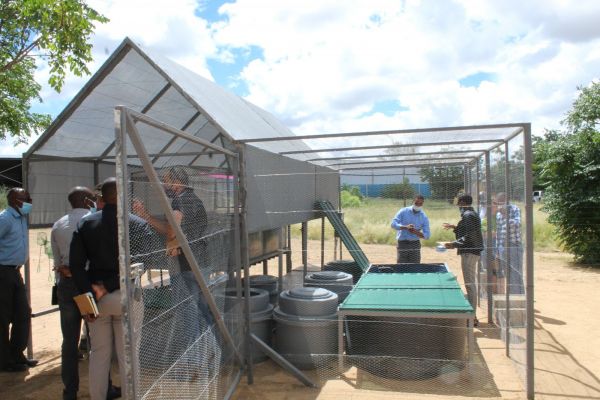
By Lot Ndamanomhata
On Tuesday, 30 March 2021, the Environmental Investment Fund of Namibia joined the Hanns Seidel Foundation (HSF), Parliament of the Republic of Namibia, Embassy of Finland, Think Namibia Aquaponics at the HSF Aquaponics Project and first pilot aquaponics system at Aris Primary School, which is located approximately 20 km from Windhoek, Khomas region.
The pilot project initiative was launched in Windhoek with assistance funding from the Embassy of Finland. The Aquaponics project aims to support improving local knowledge, training skills, and human capacity development in the field of climate-resilient aquaponics with the overall objective of promoting food security and creating new livelihoods opportunities in Namibia’s rural communities.
Speaking at the launch of the Pilot project, Dr. Clemens von Doderer, the Hanns Seidel Resident Representative highlighted that the Aquaponics project Namibia is aimed at contributing to food security in Namibia using Aquaponics-Systems in a Pilot Approach Project. He noted that “the aquaponics presents climate smart agriculture alternative practice that has the potential to enhance agricultural production, boost food security and improve living standard in rural Namibia.”
Ms. Hannele Hupanen, from the Finnish Embassy touched on the long history that the people of Finland have with conservation and forestry and hence find alternative ways of agriculture that assists rural communities who grapple with high unemployment. In addition, she also uttered that the ongoing challenges of COVID-19 has also imposed new hardships and is hopeful that the inauguration of the of this aquaponics will pave the way to achieving food self-sufficiency and economic sustainability of the people of Aris and more specifically the Aris primary School.
Also speaking at the inauguration event was Mr. Frank Williams, the School Principal of the Aris Primary School shared that the school caters for 116 school going pupils and 107 of those are in the hostel and that providing a decent meal for them on a daily basis was a challenge and he hopes that with the arrival of this Aquaponics system it will boost the food security of the school and expose the learners to practical skills from the theoretical skills in their science classes. He also thanked all that made this possible system possible.
Representing the Fund, was the Head of Communications and Corporate Services Lot Ndamanomhata, highlighted the mission of the EIF, which is to promote the sustainable economic development of Namibia through investment and promotion of activities and projects that protect and maintain the natural and environmental resources of the country. With the eminent climate challenges facing Namibia, including more than seven years of devastating drought, the Fund is still committed to supporting the government in addressing climate change issues by introducing and looking at long term solution and this is one of many interventions.
“We know that the school feeding programme is under dire stress and initiatives of this kind meets government half ways and we congratulate the initiator of this and urge custodians to ensure the sustainability of it in the long run”, Mr. Ndamanomhata said.

